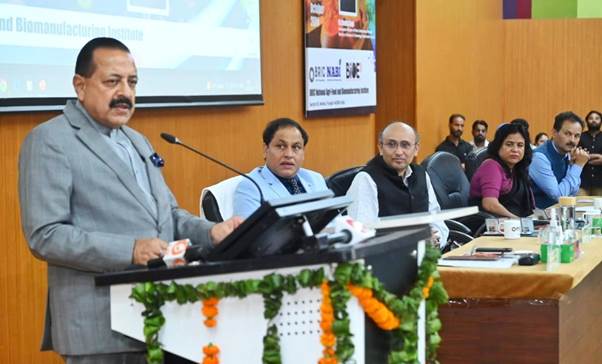Biomanufacturing Institute for Agri-Food Innovation
India has taken a pivotal step in agricultural biotechnology with the inauguration of the BRIC-National Agri-Food Bio-Manufacturing Institute. Launched by Dr. Jitendra Singh, this marks India’s first dedicated biomanufacturing institute focused on driving agri-food innovation through cutting-edge biotech. The initiative resonates with Prime Minister Narendra Modi’s vision of a “Viksit Bharat” — a fully developed India.
A Government-Driven Transformation in Agriculture
Dr. Singh emphasized the Indian government’s commitment to fostering agricultural innovation. By focusing on job creation and sustainable practices, the government is steering India toward a future-ready agri-economy. This renewed focus on science and technology is supported by the recent introduction of the BioE3 policy, which underscores India’s strategic goals for the agri-food sector.
The BioE3 Policy
Under the BioE3 policy, biotechnology takes center stage as a tool for economic development, job creation, and environmental protection. According to Dr. Singh, advancements in synthetic biology and biotech will play a transformative role in agriculture, bolstering India’s position as a global leader in scientific research and application. India is one of the few nations to launch a dedicated biotechnology policy, reflecting its commitment to growth in this field.
From Traditional Methods to Synthetic Production
The BioE3 policy is designed to guide India’s shift from traditional agricultural manufacturing methods to synthetic production. This transition aims to introduce advanced, cost-effective technologies, fostering sustainable and environmentally-friendly solutions that will contribute significantly to the nation’s economic progress.
Formation of BRIC-NABI
The BRIC-NABI was created by merging two prominent institutions: the National Agri-Food Biotechnology Institute (NABI) and the Centre of Innovative and Applied Bioprocessing (CIAB). This merger bridges the gap between research innovation and market application, creating an environment for pilot-scale production and expediting the commercialization of advanced agricultural technologies.
Research and Development at the Core
At its heart, the institute aims to drive R&D efforts that will propel India’s agricultural sector forward. The focus includes developing high-yield, disease-resistant crops, biofertilizers, and biopesticides. These advancements support the government’s vision of doubling farmers’ incomes while promoting sustainable and resilient farming practices across India.
BioNest Incubation Centre
The BioNest Incubation Centre, a vital part of BRIC-NABI, serves as an innovation hub for startups in agriculture, food processing, and bioprocessing. The center supports young entrepreneurs, women, and farmers by offering access to industry partnerships and extensive innovation networks. By promoting the commercialization of agri-food innovations, BioNest aligns with India’s broader goal of self-reliance and economic growth under the Make in India initiative.
Role of Private Sector in Biomanufacturing
Acknowledging the importance of private sector participation, Dr. Singh urged industry stakeholders to invest in initiatives that leverage the market potential of biomanufacturing. Such engagement will drive sustainable employment opportunities for India’s youth, further supporting the country’s journey toward self-reliance and industrial progress.
Biomanufacturing Workshop 1.0
The upcoming Biomanufacturing Workshop 1.0, scheduled for December 2024, will cover the applications of biomanufacturing across agriculture, food, pharmaceuticals, and energy. This workshop will be a valuable resource for researchers and industry professionals seeking insights into sustainable production techniques and future trends in biomanufacturing.
Brain Drain
Dr. Singh expressed concern about the brain drain affecting India’s scientific community. He encouraged young researchers to harness the evolving opportunities within India, which now offers a competitive scientific ecosystem. Building and retaining indigenous talent is essential to strengthening India’s standing in global science and innovation.
The Impact of BRIC-NABI
The inauguration of BRIC-NABI signifies a key milestone in India’s journey toward a science-driven economy. Through initiatives like BioE3 and BioNest, India is set to position itself as a world leader in innovation and knowledge, contributing to sustainable growth on both national and global scales.












